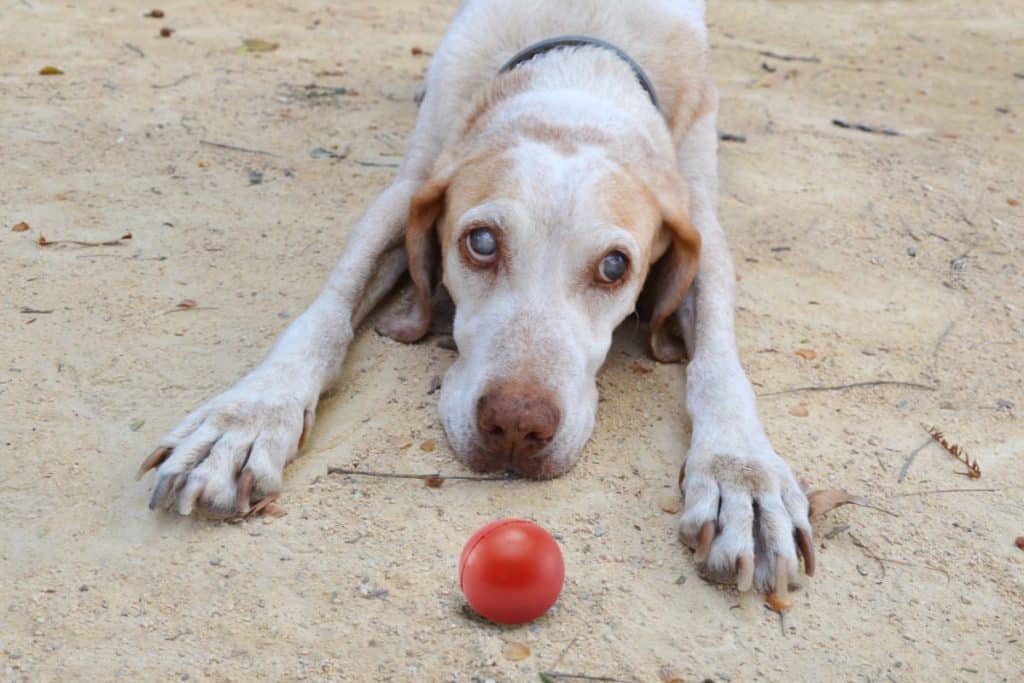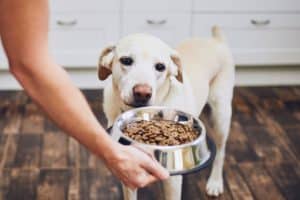If your dog isn’t behaving like normal, it’s a sign that something is not right and their equilibrium is unbalanced.
Whether you’re the proud parent of a playful puppy, an adult dog, or a wise senior, seeing your pooch refuse to eat or drink can be incredibly disheartening. The concerns could vary from age-specific ailments to more generalised health issues.
I understand your worries, but in my experience, it’s best to approach the situation calmly and methodically. A dog’s refusal to eat or drink can be symptomatic of various factors, some requiring immediate medical attention and others needing simple lifestyle adjustments.
Let’s see how.
Why is Your Dog Refusing to Eat or Drink?
1. They’re not hungry or thirsty.
I know it sounds like I’m treating you as a dolt, but that’s not true. I have been in your place and acted like a dotting dog parent. But, sometimes, they’re just not hungry or thirsty.
If you’ve recently altered their feeding schedule or given them a few too many, they might not be interested in their regular meals.
Solution: Stick to a consistent feeding schedule and reduce the extra treats. Trust me, a handful of dog biscuits here and there can add up!

2. They’re ill or have a stomachache.
A sick dog will likely be put off their food and water until it passes or they get some veterinarian attention and medicine.
It’s particularly concerning if the behaviour persists for more than a day. Infections, organ dysfunction, and chronic illnesses can severely affect your mutt’s appetite.
Our first guess is gastrointestinal or a bug/virus such as Parvo, distemper or kennel cough. If your puppy is off their food and just lays about, then take them to the vet immediately and always ensure they are vaccinated and topped up.
Pro Tip: Keep an eye out if your dog is trying to eat foreign stuff, such as soil, as this indicates an underlying condition.
3. They’re in pain.
A dog who seems lethargic and not eating could be in pain, worsening when they move and chew. And that’s why they avoid it.
Dogs with mouth ulcers, open wounds in the mouth or tooth nerve pain won’t eat because it just hurts to do it.
Your dog may have other injuries, too, such as wounds on the body or a digestive blockage that makes moving painful. A urinary tract infection is another painful condition which leaves a dog unable to move without feeling intense pain.
For senior dogs, arthritis can cause pain significant enough to deter eating or drinking. Do check up on them if your dog belongs to that age group.
Solution: Check the inside of the dog’s mouth and body for any obvious injuries, and if you spot any, take them to the vet.
4. They don’t like the food.
Who knew your doggo could be so fancy? Indeed, our dogs aren’t as picky as cats, but they have preferences.
If your dog refuses to eat after you switch to a new brand of dog food, they might not like it.
Solution: See if it makes a difference when transitioning to the previous food or trying a different brand.
5. They’re depressed due to environmental changes.

John Ciribassi, a canine expert, says that when dogs get depressed, they will
“…become withdrawn. They become inactive. Their eating and sleeping habits often change. They don’t participate in the things they once enjoyed.”
Sudden life changes can make a dog depressed and, therefore, lying about listless. Have you recently moved house? Have you brought home a new addition? Do they no longer get to enjoy the things they once had, such as long walks and days out?
Like us, dogs are simple creatures. The problem may even be as simple as a change in their dry dog food to a lesser brand, which ruined their once-loved mealtime.
6. They’re grieving from a loss.
Scientific evidence has found that dogs can mourn the loss of a fellow pet and, most certainly, a human.
One of the symptoms of a grieving dog is listlessness and depression, which in turn makes them not want to eat and be inactive throughout the day and night.
If you’ve recently had a death in the home and your dog’s behaviour has changed, there’s a good chance that grief is the cause.
Supporting a grieving dog is the same as a grieving human – they need time and emotional support as they go through the stages of grief, and eventually, they will be able to come to terms with the loss and move on.
Keep offering your dog food, water and a walk in the meantime because, eventually, they will say yes. Another top tip is to try and stick to their previous routine as soon as possible.
7. They’re dealing with the side effects of a medication.
Some medications, especially anti-inflammatory drugs and antibiotics, could mess with your dog’s stomach or change its taste buds.
Solution: Consult your vet about possible side effects and discuss alternative medication or treatments to help your doggo regain their appetite.
8. Their nutritional intake is improper.

As with humans, it’s not just about eating. It’s about eating right. Food allergies or poor diet quality can lead to a loss of appetite among dogs.
It’s common for a pooch to lose interest in food after eating a lot of fillers and low-quality protein.
Solution: Consult your vet for a nutritional plan based on your dog’s age, size, and health conditions.
9. They’re teething. (specific to puppies)
The teething phase is a time of discomfort and irritability—for both your puppy and you. The pain during teething can cause your little one to refuse food.
Solution: Soften their kibble with warm water and offer teething toys to help them eat and control the pain.
10. Their appetite is affected by parasites. (common among puppies)
Parasites like worms, fleas, and ticks can be particularly harmful to puppies and are a common reason for loss of appetite.
Solution: Use de-worming and anti-parasitic medications once you successfully identify the issue. However, you must only administer them under veterinary supervision.
11. It’s a reaction to a vaccination. (specific to puppies)
Some puppies may experience temporary lethargy or loss of appetite after vaccinations. This is usually short-lived, but it’s worth mentioning to your vet if the symptoms persist.
12. They have cognitive dysfunction syndrome. (senior dogs)
Similar to Alzheimer’s in humans, Cognitive Dysfunction Syndrome can affect senior dogs, making them confused and disoriented. It also affects their eating habits.
This complex condition requires a comprehensive treatment plan, usually involving medication, lifestyle adjustments, and plenty of patience.
13. Their metabolic rate has lowered.
It’s as simple as “your senior dog is getting up there.” As dogs age, just like humans, their metabolic rate can slow down.
They may require less food and show lower energy levels. If you’ve ruled out other health concerns, consult your vet about adjusting your dog’s diet to match reduced caloric needs.
14. They’re telling you it’s time to pass away.
According to Agape Pet Services, an elderly dog or a dog with a terminal illness will show signs of fatigue, loss of interest and a lack of appetite.
We will never know if the dog chooses to do this so that their end is on their terms or if it’s the sickness doing it. What is clear, though, is thousands of owners across the world have corroborated this behaviour during the final days of their beloved friend.
If you know your dog is getting very old or that they have a confirmed terminal illness, then consider letting your dog go peacefully and put them down (put them to sleep) rather than let their illness make their final days painful.
Ultimately, the decision must be taken under your veterinarian’s supervision to help choose the best outcome for your canine companion.

Warning Signs That Require Immediate Attention
It’s one thing for your dog to skip a meal or seem low in energy, but certain signs should set off immediate alarm bells.
- Lack of Urination or Defecation: A lack of urination or defecation usually indicates a UTI, bowel obstruction, or other gut-related health problems.
- Collapsing or Difficulty Standing: It could indicate anything from heart issues to poisoning. Remain calm and get them immediate medical assistance.
- Rapid Weight Loss: Losing a noticeable weight quickly is abnormal and could signify various issues, from thyroid problems to cancer.
- Vomiting or Diarrhoea: Occasional vomiting or diarrhoea can be standard dog behaviour, but consistent or severe symptoms may indicate a deeper issue.
- Sudden Behavioural Changes: If your usually docile dog suddenly becomes aggressive or your hyperactive pup turns lethargic, it’s worth investigating these drastic changes.
In any case, get them to a vet as soon as possible for an assessment.
How to Take Care of a Dog Who Wouldn’t Eat or Drink?
1. Consult a Veterinarian
The first thing you should do is consult a veterinarian. A complete medical evaluation will give you a full picture of what’s happening. And it’ll help in creating a treatment plan.
2. Nutritional Support
Based on your vet’s advice, make temporary dietary changes based on your dog’s age and condition.
For example, younger dogs might benefit from soft, easily digestible foods, while seniors may need a diet low in sodium and fats. You can also add hydration solutions to their water, especially if dehydration concerns them.
3. Environmental Adjustments
Lastly, consider making some environmental adjustments.
Puppies may need a quiet corner away from household noise, while senior dogs might benefit from orthopaedic beds or ramps to help them reach their favourite lounging spots.
Remember, your vet is your best resource regarding eating and drinking issues.




